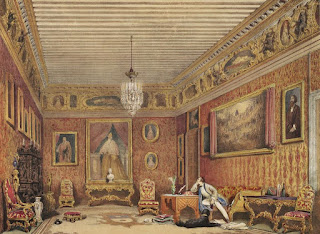Almosting it, as Stephen said.
Part two of an attempt to discuss Jeremy Hooker's The Release (Shearsman 2022). See previous post for part one.
The Prose.
The journal element in The Release is an elegant record of a questioning intelligence moving through a difficult personal time and shaping that experience in a clear precise prose. Presented as an integral part of that experience, there’s a perhaps unfashionable set of questions. What is the purpose of writing poetry in English in the 21st century; what is the purpose of art; is great art possible or desirable; what is the role of ego in first person poetry and why is the NHS so badly underfunded and staffed by overworked people who appear in the pages of the journal as compassionate figures doing their best.
For Hooker the first question seems as important as the last. He uses the journal to navigate his way tentatively, while recording his dealings with the other people in his ward, the staff, visitors and the inevitable health concerns, so the literary is not presented as something precious and off to one side but as mundane as being wheeled off for an ECG.
‘Feeling his way’ [his term] allows the writing to perform its own contradictions and avoid didacticism. I might agree with him that we need admiration bordering on hero worship in poetry, immediately qualifying that by pointing out he’s hard on his heroes, but that thought is already qualified by his references to the television in the corner of the ward and the politicians we’ve been saddled with by a different kind of hero worship.
At a time when the concept of ‘Great writing’ is often treated with suspicion, Hooker advances a case for the human need for art that does more than pass the time or reassure the audience that they’re marching in the right direction with the right crowd behind the right slogans.
He quotes Barry Lopez twice: ‘All great art tends to draw us out of ourselves’ and then Arvo Part’s wife telling Lopez that ‘what her husband composes can reassemble a person.’
Hooker comments on the second quote: ‘This is perhaps the greatest claim for art’s potential effect that I’ve met. I know that it’s true.’
Stand in front of a work of art, literally or metaphorically, and experience awe. Realise the gap between you and the made thing, and have the humility to recognise the gap and the confidence or faith to make that leap to embrace it in all its challenging alterity. If, as Hooker says ‘Poetry speaks human. And human is relational’ (p.30) then in doing so discover, paradoxically, in the singularity of the work of art, your relationship to common humanity.
Perhaps you’ve never done this. It’s difficult. You’d have to overcome so much; the automatic qualifying doubt a modern literary education drills into students; the profound suspicion of art as ideological weapon with designs upon the audience; the baffling but popular idea that art should reflect the viewer’s aims and interests, should comfort it with platitudes and commonplace, should above all else agree or provide a fashionable banner to march behind, and if it doesn’t then the best response is the bunker mentality where you hunker down behind the barbed wire of your own unexamined beliefs and then wonder why the art you see, the poems you read, are so instantly forgettable.
For decades, Hooker has been engaged professionally with what used to be called ‘Great Writers’. His pantheon is personal: Richard Jeffries, David Jones, J.C Powys. Over the course of that engagement he has refined his own ideas about them and his own work. The knowledge that there is Great Writing, and the nagging questioning of what makes it great and what it does that other writing doesn’t, informs his own poetry. The concerns in their broad outline are common enough, what makes Hooker’s exploration of them is the honesty with which he’s willing to approach them, and the fact he does it without recourse to theory or its jargon.
There are no easy answers. There may not be any answers at all. But reading Hooker is to follow a single intelligence moving through them, and we don’t have to agree with where he goes or how he gets there, but we should be grateful someone is willing to mark out the terrain.
If the journal records four stays in hospital, it provides the ground (in both the common sense and the old fashioned musical sense) for the poems. Hooker is present in the prose: his reading, his questions, his biography, his memories, but he’s absent from the poems. The prose at times risks making the reader answer the question: why are you staring over my shoulder? The poems are stand-alone works of art.
For which see the next post.


